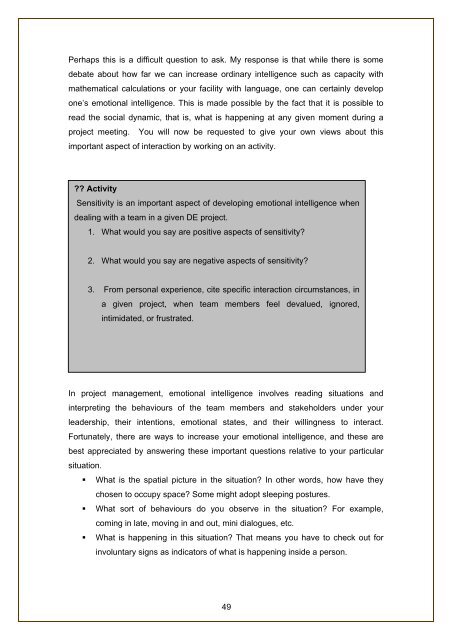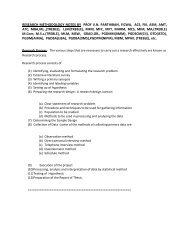successful project management - Commonwealth of Learning
successful project management - Commonwealth of Learning
successful project management - Commonwealth of Learning
You also want an ePaper? Increase the reach of your titles
YUMPU automatically turns print PDFs into web optimized ePapers that Google loves.
Perhaps this is a difficult question to ask. My response is that while there is some<br />
debate about how far we can increase ordinary intelligence such as capacity with<br />
mathematical calculations or your facility with language, one can certainly develop<br />
one’s emotional intelligence. This is made possible by the fact that it is possible to<br />
read the social dynamic, that is, what is happening at any given moment during a<br />
<strong>project</strong> meeting. You will now be requested to give your own views about this<br />
important aspect <strong>of</strong> interaction by working on an activity.<br />
?? Activity<br />
Sensitivity is an important aspect <strong>of</strong> developing emotional intelligence when<br />
dealing with a team in a given DE <strong>project</strong>.<br />
1. What would you say are positive aspects <strong>of</strong> sensitivity?<br />
2. What would you say are negative aspects <strong>of</strong> sensitivity?<br />
3. From personal experience, cite specific interaction circumstances, in<br />
a given <strong>project</strong>, when team members feel devalued, ignored,<br />
intimidated, or frustrated.<br />
In <strong>project</strong> <strong>management</strong>, emotional intelligence involves reading situations and<br />
interpreting the behaviours <strong>of</strong> the team members and stakeholders under your<br />
leadership, their intentions, emotional states, and their willingness to interact.<br />
Fortunately, there are ways to increase your emotional intelligence, and these are<br />
best appreciated by answering these important questions relative to your particular<br />
situation.<br />
• What is the spatial picture in the situation? In other words, how have they<br />
chosen to occupy space? Some might adopt sleeping postures.<br />
• What sort <strong>of</strong> behaviours do you observe in the situation? For example,<br />
coming in late, moving in and out, mini dialogues, etc.<br />
• What is happening in this situation? That means you have to check out for<br />
involuntary signs as indicators <strong>of</strong> what is happening inside a person.<br />
49
















